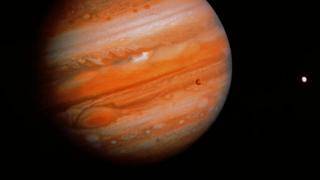ScienceRocks
Democrat all the way!
- Banned
- #1
'Welcome to Jupiter!' NASA's Juno space probe arrives at giant planet
Source: CNN
Read more: NASA: Juno space probe has arrived at Jupiter - CNN.com
Europa, Io, etc...All interesting moons to study along with jupiter. Congrats nasa!
Congrats nasa!
Source: CNN
Jet Propulsion Lab (CNN) NASA says it has received tones confirming its Juno spacecraft has successfully started orbiting Jupiter, the largest planet in our solar system.
"Welcome to Jupiter!" flashed on screens at mission control at NASA's Jet Propulsion Lab in Pasadena, California. The Juno team cheered and hugged.
"This is phenomenal," said Geoff Yoder, acting administrator for NASA's Science Mission Directorate.
Read more: NASA: Juno space probe has arrived at Jupiter - CNN.com
Europa, Io, etc...All interesting moons to study along with jupiter.
Last edited:

